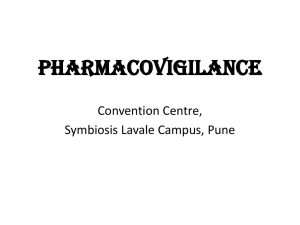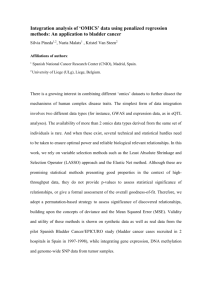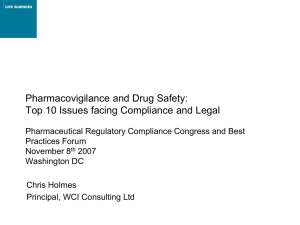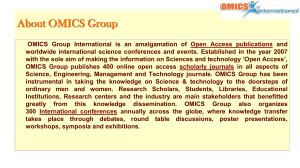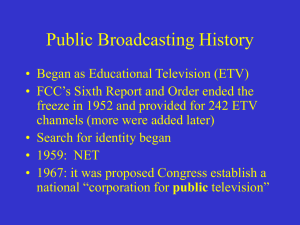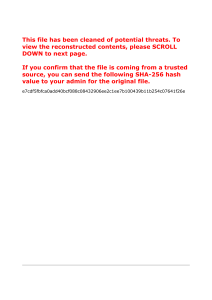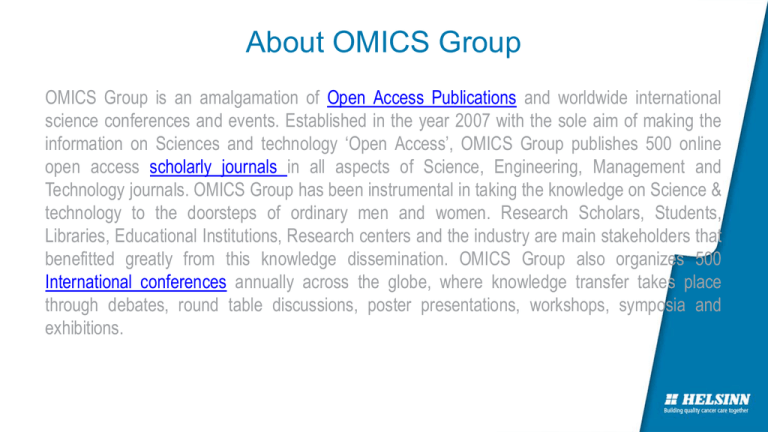
About OMICS Group
OMICS Group is an amalgamation of Open Access Publications and worldwide international
science conferences and events. Established in the year 2007 with the sole aim of making the
information on Sciences and technology ‘Open Access’, OMICS Group publishes 500 online
open access scholarly journals in all aspects of Science, Engineering, Management and
Technology journals. OMICS Group has been instrumental in taking the knowledge on Science &
technology to the doorsteps of ordinary men and women. Research Scholars, Students,
Libraries, Educational Institutions, Research centers and the industry are main stakeholders that
benefitted greatly from this knowledge dissemination. OMICS Group also organizes 500
International conferences annually across the globe, where knowledge transfer takes place
through debates, round table discussions, poster presentations, workshops, symposia and
exhibitions.
OMICS International Conferences
OMICS International is a pioneer and leading science event organizer, which publishes around
500 open access journals and conducts over 500 Medical, Clinical, Engineering, Life Sciences,
Pharma scientific conferences all over the globe annually with the support of more than 1000
scientific associations and 30,000 editorial board members and 3.5 million followers to its credit.
OMICS Group has organized 500 conferences, workshops and national symposiums across the
major cities including San Francisco, Las Vegas, San Antonio, Omaha, Orlando, Raleigh, Santa
Clara, Chicago, Philadelphia, Baltimore, United Kingdom, Valencia, Dubai, Beijing, Hyderabad,
Bengaluru and Mumbai.
HELSINN BIREX
PHARMACEUTICALS LTD
Inefficiencies in pharmacovigilance: what
can we do now and what could be done in
the future
Giovanni Furlan
EU QPPV Helsinn Birex
Disclaimer
The views and opinions expressed in the following
PowerPoint slides are those of the individual presenter
and should not be attributed to Helsinn, its directors,
officers, employees or affiliates or any organization with
which the presenter is employed or affiliated.
These PowerPoint slides are the intellectual property of
the individual presenter and are protected under
copyright laws. Used by permission. All rights reserved
What are we going to discuss ?
Do the pharmacovigilance regulations achieve their aim of protecting patient
safety ?
Have they become cumbersome and complex ?
Do we have too many regulations, resulting in too much redundant effort that
has forced us in Drug Safety to spend more time doing busy work than actually
monitoring, evaluating, and analyzing safety information so to take adequate
risk minimization measures ?
Did ICH achieve the aim of harmonizing regulations?
U.K. Prime Minister David Cameron will push for lighter regulations on the pharmaceutical
industry in order to speed the path of new medicines to the market.
Cameron, who is in Washington to meet with President Barack Obama, sees the current
process of developing and licensing new drugs as “abhorrently expensive and time
consuming,” according to a statement from his office
Chinese regulations
PSURs are prepared in the old ICH format (R1).
Periodicity: every year since obtaining registration until renewal. Then every five
years
Data collection period
Data collection for the Periodic Safety Update Report commence as of the day
when the drug approval documents are obtained, and collected data shall be
reported within 60 days after the data deadline. It is permitted to submit the
Periodic Safety Update Report with the data’s international generation date as
the collection commencement date, provided that, if the data deadline of the
aforesaid report is earlier than that required in China, the data collected after the
deadline of the report till the required deadline shall be supplemented and
analyzed
Chinese ICSRs regulations
ICSRs originating in China
All adverse reactions occurred within 5 years from the date of authorization
Any new and/or serious adverse drug reactions occurred after 5-year period
Timelines:
Any new and/or serious adverse drug reaction within 15 days from first awareness
Death cases shall be reported immediately, other ADRs in 30 days
Follow-up information shall be timely
Death cases: investigation report in 15 days
All serious adverse reaction from outside China in 30 days
PSUR cover letter requires:
• Main new safety information received in the reporting period
• Patient exposure
• Description of unlisted ADRs received during the reference period
• No of fatal cases
• Data on safety studies conducted during the reference period
• Routine pharmacovigilance activities/actions related to newly received safety
information described in the latest RMP
• Minimization activities/actions related to new safety information described in the latest
RMP
• Summary tabulation of ICSRs included in the PSUR
Latin America requirements for non serious cases
Argentina: pregnancy associated with ADR: 7 calendar days
pregnancy not associated with ADR: 15 calendar days
Costa Rica: 10 working days
Ecuador: every two months
Panama: 15 calendar days
Peru:
10 working day
Chile:
monthly
There is the need to harmonize PV requirements world wide
Which should be the reference standard ?
ICH ? EU legislation?
Which are the pros and cons of these standards?
Changes in EU pharmacovigilance legislation:
From Volume 9a (229 pages) to:
12 finalized GVPs + definitions, templates for RMP (60 pages) and
PSUR, abbreviations, 3 GVPs still not final
9 «Other pharmacovigilance guidance» (final GVP annex III)
Guidance documents for submission of data to XEVMPD:
9 documents
Detailed guidance on the electronic submission of information on medicinal products for
human use by marketing authorisation holders to the European Medicines Agency in
accordance with Article 57(2), second subparagraph of Regulation (EC) No 726/2004
XEVPRM technical specifications, Chapter 3.I : 224 pages
References:
http://www.ema.europa.eu/ema/index.jsp?curl=pages/regulation/document_listing/document_listing_000345.jsp&mid=WC0b01ac058058f32c
http://www.ema.europa.eu/ema/index.jsp?curl=pages/regulation/document_listing/document_listing_000336.jsp&mid=WC0b01ac05804d8b2b&jsen
abled=true
Changes in ICH guidelines
ICH E2B R3:
166 page implementation guide + 8 appendices - “old” E2B R2 was 29 pages
ICH E2C (new vs old version) grew from 10 to 19 chapters
Purpose of new EU legislation
Impact of the new legislation on marketing-authorisation holders
Marketing-authorisation applicants and holders are impacted by the legislation in a
number of key areas. The legislation aims to:
• make roles and responsibilities clear;
• minimise duplication of effort;
• free up resources by rationalising and simplifying periodic safety update reports
(PSURs) and adverse-drug-reaction (ADR) reporting;
• establish a clear legal framework for post-authorisation monitoring.
Redundancies are recognized
(EMA/CHMP/ICH/544553/1998)
Redundancies have not been resolved
16 out 40 sections in common between PBRER and DSUR; 3 with RMP
Periodicity is not the same:
• Annually for DSUR
• PBRER: Every 6 months after placing on the EU market for 2 years; once a year for 2 years;
every 3 years. (depending on EU RD list)
• RMP: at the request of an authority; when important milestone is reached; new information
can change the benefit-risk balance of the product
No modular approach is possible
• PADER: quarterly for first 2 years, then annually
Redundancies
Renewals
• No PSUR is required, but addendum to clinical overview (in practice a PBRER in a different
format with benefit evaluation and benefit-risk balance sections)
• Clinical Expert Statement (with confirmation that there are no new data that can change the
benefit-risk balance)
Signal detection:
The marketing authorisation holder:
shall monitor the data in EudraVigilance to the extent of their accessibility. The frequency of
the monitoring should be at least once monthly and shall be proportionate to the identified
risk, the potential risk and the need for additional information
How many monthly signal detection reports for acetylsalicylic acid will be prepared ?
Documents addressing signals, risks, benefit-risk balance
(post marketing)
PBRER
PSUR
RMP
PADER
Signal
detection
reports
Safety
information
for referrals
Addendum
to clinical
overview
More complicated overlapping documents = more time =
additional costs
Clinical trials regulation 536/2014
Protocol (Annex I section d, 17)
The protocol shall at least include:
• A summary of findings from non-clinical studies that potentially have clinical significance and
from other clinical trials that are relevant to the clinical trial
• A summary of the known and potential risks and benefits including an evaluation of the
anticipated benefits and risks
Investigator’s Brochure (Annex I section e, 27)
The information in the IB…..enables a clinician or investigator to understand it
and make an unbiased benefit-risk assessment of the appropriateness of the
clinical trial
Clinical trials regulation 536/2014
Investigational medicinal product dossier –IMPD- (Annex I, G)
SCOPE: The IMPD shall give information on the quality of any investigational medicinal
product…and data from non-clinical studies and from its clinical use
• The IMPD shall also contain summaries of non-clinical pharmacology and toxicology
data (point 41)
• Overall risk and benefit assessment (point 48): This section shall provide a brief integrated
summary that critically analyses the non-clinical and clinical data in relation to the potential risks
and benefits of the investigational medicinal product……unless the information is already provided
in the protocol. In the latter case, it shall cross-reference to the relevant section of the protocol
DSUR (Art 43)
…as usual
Redundancies from clinical trial regulations
Four documents with benefit-risk information for clinical trials:
IB is updated at least annually
DSUR is prepared annually
IMPD and protocol ? Will they need to be updated annually?
Documents addressing signals, risks, benefit-risk
PBRER
DSUR
PSUR
PADER
RMP
Signal
detection
reports
IB
IMPD
Protocol
Safety
information
for referrals
Addendum
to clinical
overview
What is the impact of redundant regulatory requirements on the quality
of the work ?
…and on the pharma sector in general?
What happens when costs increase but revenues don’t increase?
In pharma industry we see:
- No new antibiotics being developed
- Focus is on orphan drug development (costs less to develop), cancer,
monoclonal antibodies (biogenerics are more difficult to register, innovator
has longer market exclusivity)
- Drug shortages
In pharmacovigilance:
• Work outsourced at lowest possible cost (low cost = low quality ?)
• Work done by under qualified personnel
• Number of employees does not increase in a proportionate way to
workload = work exceeds staff capacity
• Copy and paste exercises
Is this in the best interests of patient safety ?
Interactions between components playing a role in
pharmacovigilance quality
Any ideas on how simplify aggregate reports?
Do we need all of them?
What are aggregate reports/pharmacovigilance about ?
1) What is known about a medicinal product (e.g. mechanism of action, patient exposure,
action taken by regulatory authorities/MAH, which studies have been conducted, effect
of products of the same class, metabolism)
2) What is not know about a product (e.g. in populations subgroups -safety/efficacy-)
3) Main risks (known and unknown)
4) Efficacy (known and unknown)
5) New safety information received during the reference period (risk characteristics,
signals, benefits)
6) How are risks minimized
7) What has to be done to collect information on the unknowns
8) Benefit-risk evaluation
1 Introduction
2 World-wide Market Authorization Status
3 Inventory of Ongoing/Completed Safety Studies*
4 Changes to RSI*
5 Regulatory Actions Taken for Safety Reasons**
6.1 Patient Exposure**
6.2 Limitations of Human Safety Database
An “old” proposal
7 Drug Risks Currently Under Evaluation
7.1 General Introduction (describe how the risk was identified and by whom)
7.2 Sources of Evidence
7.2.1 Spontaneous Reports
7.2.2 Company Sponsored/Supported Interventional Studies
7.2.3 Company Sponsored/Supported non-Interventional Studies
7.2.4 Literature
7.2.5.Other Sources
7.3 Risk Characterization and Evaluation
7.3.1 Risk Factors and sub-Populations at Risk
7.3.2 Risk Severity/Seriousness and Frequency
7.3.3 Biological Plausibility
7.3.4 Clinical Plausibility (evidence strength and consistency)
7.3.5 Risk Impact on Compliance and Benefit-Risk Balance
7.3.6 Actions Taken and further actions that could be taken
8 Summary of resolved drug risks
Reference: Drug Safety 2012; 35(8):615-622
* during the reference period
** cumulative and during the reference
period
Drug Safety Master file: benefits
•
•
•
•
•
No duplication
No inconsistencies between documents
One single assessment from authorities = no diverging assessments
Harmonization between documents, internationally
More resources for scientific assessment of safety data, collecting
data, risk minimization activities
Is there anything the industry can do to simplify clinical and PV
operations?
Why do we use separate clinical and PV databases?
Is there any benefit in having 2 separate databases?
Inefficiencies originating from separate clinical and safety
databases
Clinical and safety run their operations independently and use separate databases with
different data standards: CDASH (Clinical Data Acquisition Standards Harmonization) and
E2B
• Duplicate data entry of SAEs and/or QC
• Different coding dictionaries or different versions of the same dictionary
• Reconciliation
• Maintenance and validation of two separate databases
• Drug safety does not immediately have access to all safety data originating from
clinical trials (i.e. lab data/clinical exams, non-serious adverse events). More difficult to
prepare:
o IBs
o DSURs
o Signal detection reports
Inefficiencies originating from separate clinical
and safety databases
•
•
•
•
Duplicate queries to Investigators
If EDC is implemented: drug safety may not be aware of SUSARs
Less accurate signal validation and evaluation
Increased costs (two data repositories, more time, more personnel)
Why two different standards ?
They have been developed independently
CDASH is an industry convention for accommodating SDTM FDA requirements , ICH is
global
Clinical Data Interchange Standards Consortium (CDISC):
Mapped E2B (R2) with CDASH
Can operations be improved?
The differences between CDASH and E2B R2 are a matter of conventions, not driven by
different scientific requirements.
Examples
E2B is more granular than CDASH
Dates for reporting information are not captured from the reporter (E2B – first awareness
date) but extracted from the EDC (each entry has a date).
CDASH employs letters for field labelling (e.g. AESDTH), while E2B alphanumeric with
no relation to data type (A.1.5.2)
Reference: Current drug safety 2013, 8(1): 56-62
With release of new E2B R3 mapping needs to be re-done
HL7 needs to be accommodated
New standard to be developed
One data repository for all study data
Safety
Module
EDC
Unify
Trial Site Key Data
Clinical
Module
CDASH
Internationally recognised data standard
Internationally recognised safety report
SDTM
E2B XML file
ICSR
SQL Data Retrievals
PSUR
SQL Data Retrievals
SQL Data Retrievals
XML
DSUR
CRTs
SDTM
SAS datasets
ADaM
Potential benefits
•
•
•
•
•
No duplicate data processing
Same coding dictionary
No reconciliation
Reduced cost: one database instead of two, less time, less personnel
Drug Safety has access to all clinical safety data:
Easier preparation of aggregate reports
Reduced time and cost for preparing aggregate reports
Better signal validation and evaluation
• Safety and clinical become aware of SUSARs at the same time
Challenges
•
•
•
•
Clinical and drug safety departments will need to be restructured
Closer cooperation between departments
Development of one single standard (unified database)
For each study, define which database fields are relevant (for safety data)
Systems Approach
A system should not be the result of the development of its single components in isolation
without taking into account the relationships among all socio-technical components
(i.e. the interactions between all stakeholders, components and factors – drug safety employees,
environmental pressures, regulatory authorities, processes, etc.)
1994: US Army Blackhawk helicopter was shot down in north Iraq by friendly fire
System evaluation of the accident revealed multiple redundant layers of control
Many overlapping responsibilities and departments involved
Departments were using different communication codes and wave lengths
Complication, redundancy, overlap does not prevent failure
More is not better, it can be worse
Reference: Nancy G. Leveson. Engineering a Safety world. The MIT Press
ACRES (Alliance for Clinical Research Excellence and Safety)
A multi-sector alliance of like-minded people and organizations working
collaboratively to build shared Global System for Clinical Research
Excellence
Foster more effective and efficient ethical and regulatory oversight
through standardization, innovation, collaboration and stakeholder
engagement
Working on unified database project to make it reality
Questions ?
Any ideas ?
Let us meet again..
We welcome you all to our future conferences of OMICS International
5th International Conference & Exhibition on Pharmacovigilance & Clinical Trials
On
September 19 - 21, 2016 at Vienna, Austria
http://pharmacovigilance.pharmaceuticalconferences.com/

